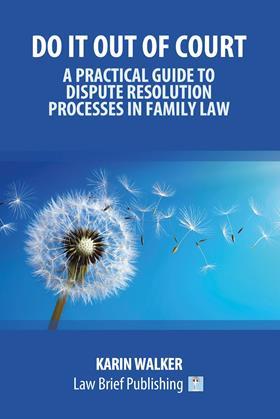Whistle-stop guide to your non-court journey
Do It Out Of Court: a practical guide to dispute resolution processes in family law
Karin Walker
£39.99, Law Brief Publishing
★★★★✩
Do It Out Of Court is a ‘straight-talking’ guide for family lawyers who are not confident or motivated to engage with non-court processes. It will help those who have not yet trained to become mediators, collaborative practitioners or who have not seen the benefits of avoiding court by using early neutral evaluation, private financial dispute resolution (FDRs) and arbitration, to get a sense that this could be for them and their clients after all.

The first section makes a strong case for why and how you might move into this way of working. It highlights:
- dealing effectively with your client and the other spouse/lawyer;
- how to use the mediation information and assessment meeting process to further inform your client; and
- what is in it for you as a practitioner (costs targets and wellbeing).
The second section discusses the out-of-court options and how they work. It gives the lowdown, for a family lawyer, on:
- mediation and how it can be improved with the use of lawyers and arbitration. Your role in supporting this process and more importantly your client’s role;
- the all-important voice of the child (which, frankly, almost all practitioners ignore) and child-inclusive mediation;
- hybrid mediation (the different role of the mediator and the presence of lawyers as a norm);
- neutral evaluation, where you instruct a third party to explain what they would expect to happen at court or arbitration on issues with obvious disagreement early on in a case;
- collaborative process, its provenance, evolution and how it works;
- the private FDR and how this gold standard process can help you achieve settlement;
- arbitration – perhaps the longest section, including a detailed worked example to help you understand its operation;
- Karin’s own Certainty Project, which combines arbitration with mediation (along with other non-court processes), with, again, an illustration of how this works; and finally
- some top tips.
If you are thinking about moving with the times, this book will give you every confidence to embrace non-court processes in your legal practice. It is a quick and easy read which will leave you optimistic about how to have better quality work and still get great results for clients. You do not need specific training in non-court processes; this guide will have you self-assuredly using them on your own terms and in the best interests of clients. It will only take a couple of hours to read this informative text and you can refer to it as often as you need to.
This book is an excellent place to start your non-court practice journey.
Jo O’Sullivan of O’Sullivan Family Law Ltd is the author of (Almost) Anything But Family Court (Bath Publishing: 2022) and a non-court family law practitioner































No comments yet